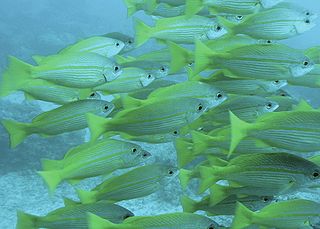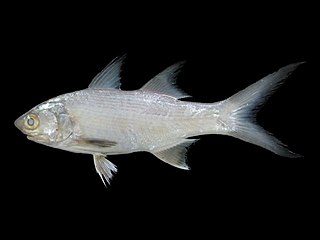
The cutlassfishes are about 45 species of predatory fish in the family Trichiuridae of the order Scombriformes found in seas throughout the world. Fish of this family are long, slender, and generally steely blue or silver in colour, giving rise to their name. They have reduced or absent pelvic and caudal fins, giving them an eel-like appearance, and large fang-like teeth.

Threadfins are silvery grey perciform fish of the family Polynemidae. Found in tropical to subtropical waters throughout the world, the threadfin family contains eight genera and about 40 species. An unrelated species sometimes known by the name threadfin, Alectis indicus, is properly the Indian threadfish.

The Atlantic threadfin is a species of ray-finned fish, a threadfin from the family Polynemidae native to subtropical and temperate waters of the western Atlantic Ocean and the Gulf of Mexico.

Sardinella is a genus of fish in the family Dorosomatidae found in the Atlantic, Indian and Pacific Ocean. They are abundant in warmer waters of the tropical and subtropical oceans. Adults are generally coastal, schooling, marine fish but juveniles are often found in lagoons and estuaries. These species are distinguished by their ranges and by specific body features, but they are often confused with one another. Fish of the genus have seven to 14 striped markings along the scales of the top of the head. The paddle-shaped supramaxilla bones are characteristic; they separate Sardinella from other genera and their shapes help distinguish species. They have paired predorsal scales and enlarged fin rays.

Sargocentron is a genus of squirrelfish found in tropical parts of the Indian, Pacific and Atlantic Oceans, with the greatest species diversity near reefs in the Indo-Pacific. Being largely or entirely nocturnal, they have relatively large eyes. Red and silvery colours dominate. The preopercle spines are venomous and can give painful wounds. Most have a maximum length of 15–25 cm (6–10 in), but S. iota barely reaches 8 cm (3 in), and S. spiniferum can reach more than 50 cm (20 in).

Lutjanus is a genus of marine ray-finned fish, snappers belonging to the family Lutjanidae. They are found in the Atlantic, Indian, and Pacific Oceans. They are predatory fish usually found in tropical and subtropical reefs, and mangrove forests. This genus also includes two species that only occur in fresh and brackish waters.

Tetraroginae is a subfamily of marine ray-finned fishes, commonly known as waspfishes or sailback scorpionfishes, belonging to the family Scorpaenidae, the scorpionfishes and their relatives. These fishes are native to the Indian Ocean and the West Pacific. As their name suggests, waspfishes are often venomous; having poison glands on their spines. They are bottom-dwelling fish, living at depths to 300 metres (980 ft). These creatures usually live in hiding places on the sea bottom.

The giant African threadfin is a species of ray-finned fish from the threadfin family Polynemidae. It is found in the eastern Atlantic Ocean off the west coast of Africa.

Polydactylus sexfilis, the six-finger threadfin or yellowthread threadfin, is a species of marine ray-finned fish, a threadfin from the family Polynemidae which is found in the Indian and Pacific Oceans.

The king threadfin, also known as the blind salmon, blink tassel-fish, burnett salmon, gold threadfin, king salmon, kingfish, Sheridan threadfin, striped tassel fish, or threadfin salmon, is a species of marine ray-finned fish, a threadfin from the family Polynemidae which is found in southern New Guinea and northern Australia.

Cynoglossus is a genus of fish in the family Cynoglossidae. Most species are indigenous to the Indo-Pacific region, but there are also a few in warmer parts of the East Atlantic. They are commonly found in shallow waters on a muddy or sandy bottom, including estuaries and a few species are restricted to fresh water. One species Cynoglossus sinusarabici has invaded the Mediterranean Sea through the Suez Canal from the Red Sea, a process known as Lessepsian or Erythrean migration.

Minous, is a genus of marine ray-finned fishes, it is the only genus in the tribe Minoini, one of the three tribes which are classified within the subfamily Synanceiinae within the family Scorpaenidae, the scorpionfishes and their relatives. They are commonly known as stingfishes. They are found in the Indo-West Pacific.

Gerres is a genus of mojarras found mostly in coastal regions from the eastern Atlantic Ocean through the Indian Ocean to the western Pacific. A single species, G. simillimus, is from the East Pacific. They mainly inhabit salt and brackish waters, but will enter fresh water. At least one species, Gerres cinereus, displays an ability akin to gyroscopic stability, allowing it to remain in a remarkably static spatial position relative to the water flowing around it.

Pristipomoides is a genus of marine ray-finned fish belonging to the family Lutjanidae, the snappers. They are found in the Atlantic, Indian and Pacific oceans.

Polydactylus sextarius, the blackspot threadfin, is a species of marine ray-finned fish, a threadfin from the family Polynemidae which is native to the western Pacific and eastern Indian Oceans.

Polydactylus plebeius, the striped threadfin, also known as the common threadfin, Northern threadfin or puttynose, is a species of marine fish native to the Indo-Pacific.

Dentex is a genus of marine ray-finned fishes belonging to the family Sparidae, which includes the seabreams and porgies. The fishes in this genus are found in the eastern Atlantic Ocean and the eastern Indian and Western Pacific Oceans.

Polynemus is a genus of threadfins. They are native to South and Southeast Asia and, depending on the species, occur in freshwater, brackish, and/or marine environments.

Filimanus is a genus of marine ray-finned fishes, threadfins from the family Polynemidae.


















